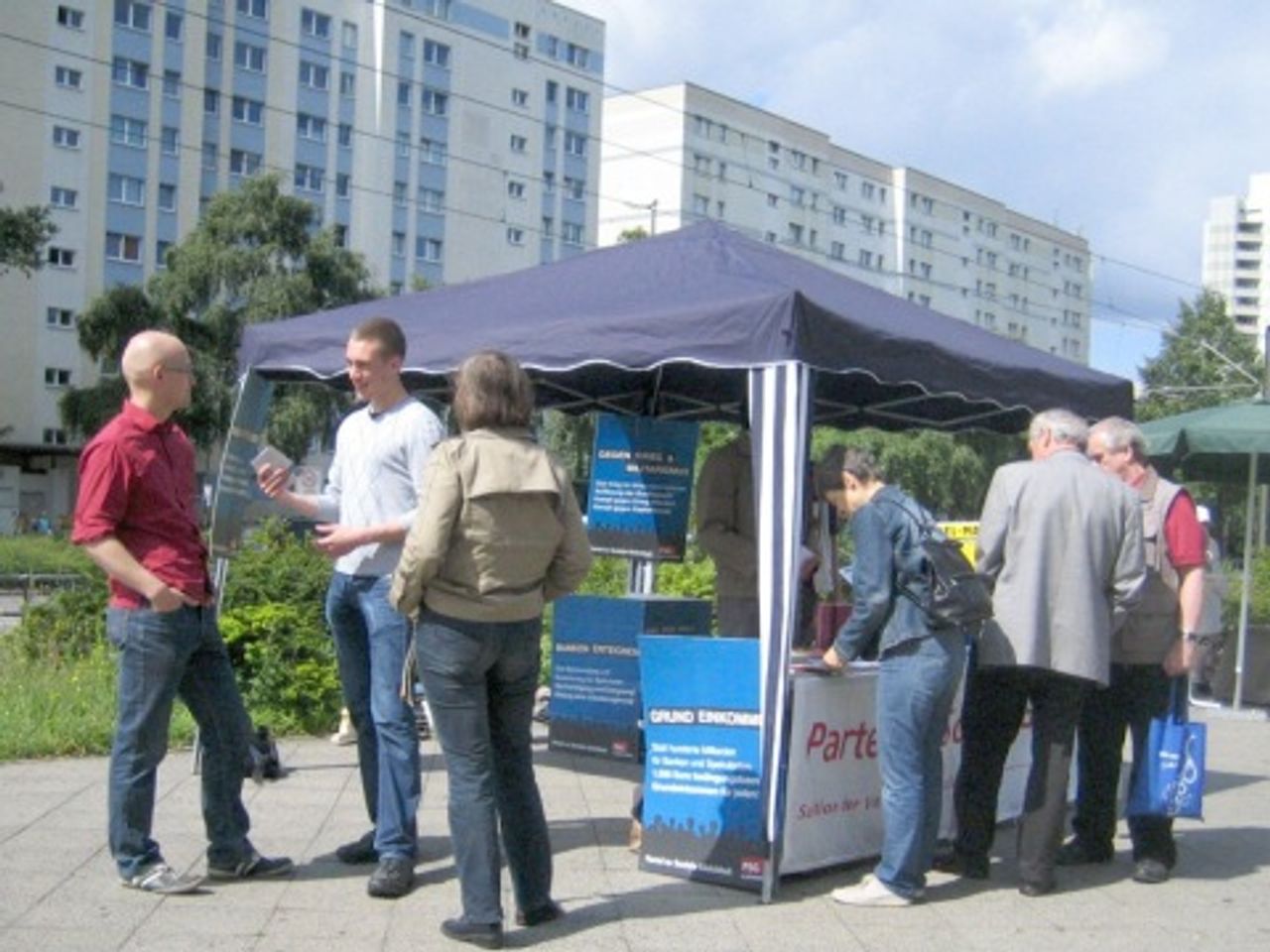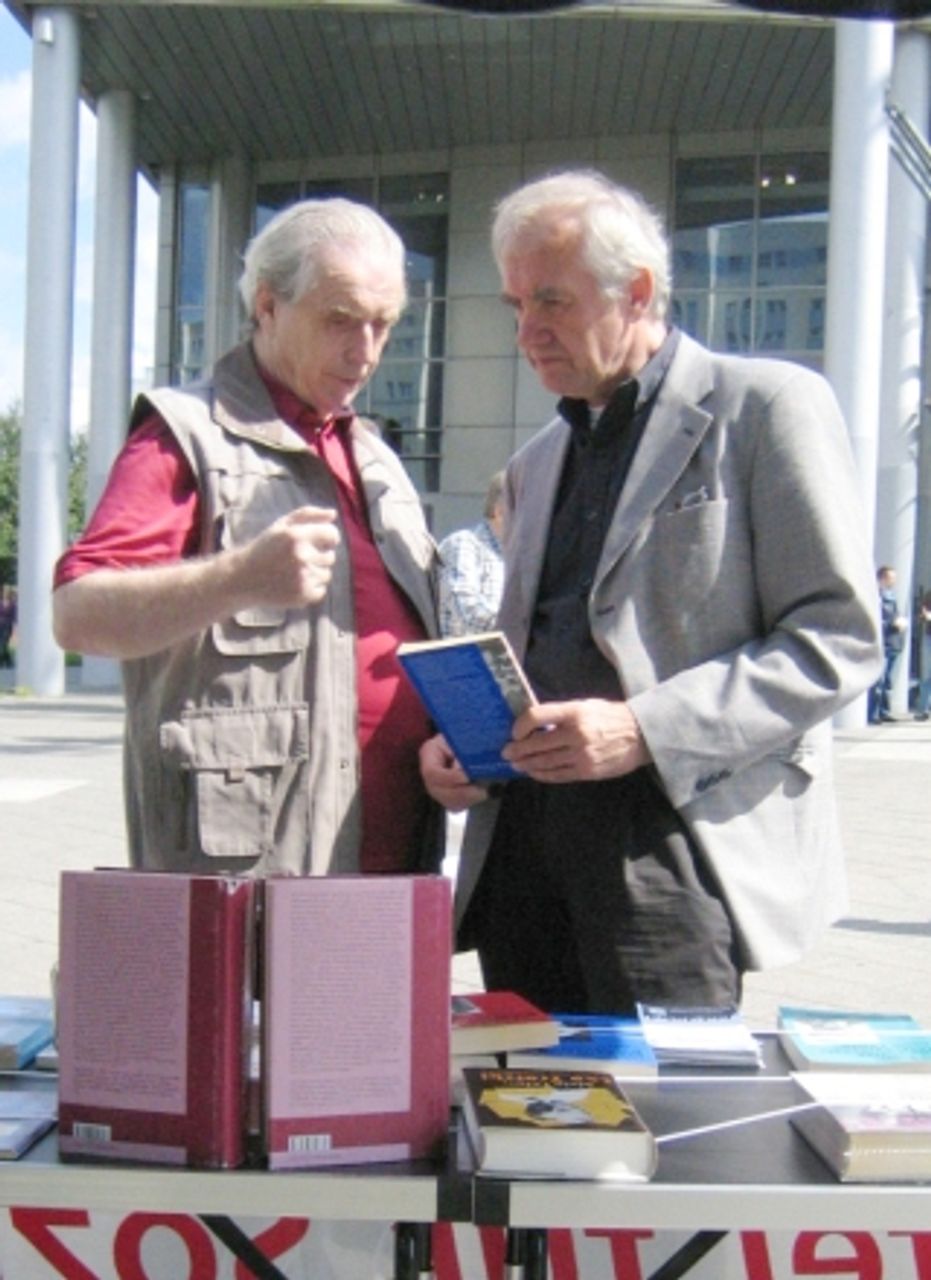On Saturday, August 13, the Socialist Equality Party (Partei fur Soziale Gleichheit, PSG) held the first rally in its campaign for the election set for September in the city-state of Berlin.
The public rally took place in Lichtenberg, a working class neighborhood in the east of the city. The district has an official total of 14,000 registered unemployed and 4,000 so-called “communities in need”—an indication of poverty levels. Lichtenberg is one of the strongholds of the Left Party, which won nearly 50 percent of the vote here in the last federal election in 2009.
In discussions at the party’s information stand, party members and supporters explained why the PSG differs fundamentally from the Left Party and all other parties. The PSG is not aspiring to win posts in the City Council and will not participate in a capitalist Senate. It is building a socialist alternative to conformist politics and the party bureaucracies and preparing a social revolution aimed at expropriating the major corporations and banks.
 Discussion at the PSG information stand in Lichtenberg
Discussion at the PSG information stand in LichtenbergSpeaking to a crowd of onlookers, PSG candidate Christopher Dreier took a stand on behalf of the youth involved in the recent riots in Britain. “We stand fully on the side of the youth. Their revolt is the result of state repression and the flagrant social inequality that condemns an entire generation to a life of poverty.”
The label “bandits and criminals” used by British Prime Minister David Cameron to describe young people is more appropriate for him and his political allies, Dreier said. Just recently, details emerged in the Murdoch scandal of the decades of collusion between the British bourgeois parties and the media.
He argued that the hypocrisy of the ruling elite was shown in particular by their varying reaction to the crimes committed by bankers and the representatives of finance capital, on the one hand, and the youth revolt, on the other. The bankers responsible for driving the economies of entire countries into bankruptcy continue to operate with impunity and lead their lives of luxury. Two thousand young people, however, have been convicted in summary proceedings, with some given draconian sentences. An 11-year-old was sent to prison for the theft of a trashcan from a department store.
The PSG demands the immediate release of all convicted juveniles and the withdrawal of police from the affected suburbs. “Every young person has a right to education, work and a reasonable life”, Dreier concluded. When a social system is incapable of granting this, then it has lost its raison d’etre.
PSG candidate Susanne Salamah declared it was time to “build a new political force, which places people and not the profit motive at the center of its activities”. After 10 years of the SPD (Social Democratic Party)-Left Party Senate, the social divide in Berlin is greater than ever: “More than 370,000 unemployed, with about 300,000 on welfare, twice as many temporary workers compared to a few years ago, and 110,000 full-time workers who are still dependent on Hartz IV—this is a devastating record.”
In particular, the reaction of the Left Party to the social plight in the city is shameful and shows where it stands, despite its sporadic talk of socialism. The Left Party had actively participated in emptying the city’s coffers.
The PSG candidate noted that upon taking office 10 years ago, the first act of the SPD-Left Party Senate was to take over responsibility for the debts of the bankrupt Berlin Banking Society (BGB). The Senate handed over €1.75 billion from Berlin’s state budget to the BGB and committed the city to guarantee the bank’s debts of €21.6 billion. Today, Berlin has €60 billion in debts and pays an interest burden of €300 million annually from the state budget.
Now, the Left Party seek to present the debt and interest burden as something outside its control and responsibility while using the debts to justify austerity policies directed against the working population.
The result of these austerity measures, Susanne Salamah continued, were disastrous: with the support of the Left Party, mass layoffs have taken place in the public sector, wages slashed and workers’ rights dismantled over the past 10 years. The Senate’s promise not to permit the privatisation of public property was broken; 65,000 homes owned by the state-run housing cooperative GSW have been sold off to property sharks. The Senate was able to make savings of around €1 billion while tenants were forced to pay higher rents or move out.
The fees for child care in day care centers have been increased, funding for youth and leisure facilities cut, swimming pools, libraries, youth clubs and leisure facilities closed down. The special travel ticket for those in need was abolished and then reinstated after protests, but at an exorbitant price. There is no money for integration policy, and fees are to be introduced for teaching materials in schools. The growth of private schools has led to an ever-increasing social divide in Berlin.
The Left Party secured billions for the banks when it took office and since then has played a significant role in the Senate, driving down the living standards of working people in Berlin. “Their political task is to portray the social misery as something which is inevitable and thereby preserve the existing political relations”, she concluded.
“It is necessary to prepare for major social and political changes”, declared Ulrich Rippert, chairman of the PSG. In his address, he referred to the popular uprising in Egypt, the mass demonstrations in Israel and the youth revolt in England. “They all have a common basis. They are an expression of the worsening international crisis of capitalism”, he said.
 PSG Chairman Ulrich Rippert in discussion with a passerby
PSG Chairman Ulrich Rippert in discussion with a passerbyOne hears from all sides that the coffers are empty, but no one tells you who emptied them. All over the world, the number of millionaires and billionaires is increasing, the banks and corporations have raked up record profits. “The money is there”, Rippert said. “But what we see is a massive redistribution from the bottom to the top.”
It was this social inequality that was the driving force behind the popular uprisings in Cairo, Athens and London, and no one should believe that the protests would be limited to abroad. A similar revolutionary storm was brewing in Germany. The PSG regards its task as preparing for this development to steer it in a progressive direction. Only the intervention of hundreds of thousands in political struggle can halt the offensive of the financial elite.
As the German section of the Fourth International, Rippert said, the PSG bases itself on the long heritage of revolutionary Marxism. Leon Trotsky founded the Fourth International in 1938 to defend the programme of socialist internationalism against Stalinism and social democracy. Only on this basis is it possible to raise the political consciousness of the workers and build on the revolutionary traditions of the past.
Rippert pointed out that just a few kilometres away from the rally, the German president and chancellor were taking part in a commemoration of the 50th anniversary of the Berlin Wall. They would use the opportunity to once again spread anticommunist lies and represent the collapse of Stalinist East Germany (GDR) as a failure of socialism. What had failed, however, was the Stalinist bureaucracy. The PSG was also a staunch opponent of the Berlin Wall and the Stalinist regime in East Germany, but had always made its criticisms from the left. It had made clear that there had been worthwhile economic and social achievements in the GDR, but that these were subsequently swept away in the process of the capitalist reunification of Germany.
The hypocrisy of bourgeois politicians with regard to the Berlin Wall, the PSG chairman said, was demonstrated by the fact that a new wall has been erected in Europe in the past few years—a wall to prevent refugees from Africa from reaching Europe. This wall has already caused enormous suffering. The number of Africans who have already drowned in the Mediterranean was far in excess of the number of victims of the Berlin Wall, but no bourgeois politician has raised this issue or done anything to end this humanitarian disaster at Europe’s borders.
Rippert warned against the dangers brought about by the dramatic fluctuations and losses on the stock markets: “They represent a new stage of the crisis, in which the financial elite dictates terms to governments and increasingly calls for a strong hand capable of enforcing drastic social cuts and the dismantling of civil rights.”
It recalled the end of the Weimar Republic and should be taken as a warning by all workers. It should also encourage them to take up the struggle against the dictatorship of finance capital. Otherwise it was impossible to resolve a single social problem. This is why workers needed a revolutionary party capable of providing leadership. Rippert said that every one of us shares responsibility: “How future developments proceed depends solely on what we do!”
Numerous discussions on the fringe of the rally indicated that many people are extremely disappointed with the policies of the Left Party. In many cases, this disillusionment has led to extreme skepticism and a complete rejection of all parties. This confirms the analysis of the PSG, that it is in particular the betrayal of social democracy and Stalinism that has led the working class into a political dead end.
The coming class struggles, however, will rekindle a broad political debate. The most important factor is the intervention of the PSG as the political alternative that rejects all forms of shortsighted political opportunism and clearly fights for a socialist perspective.
